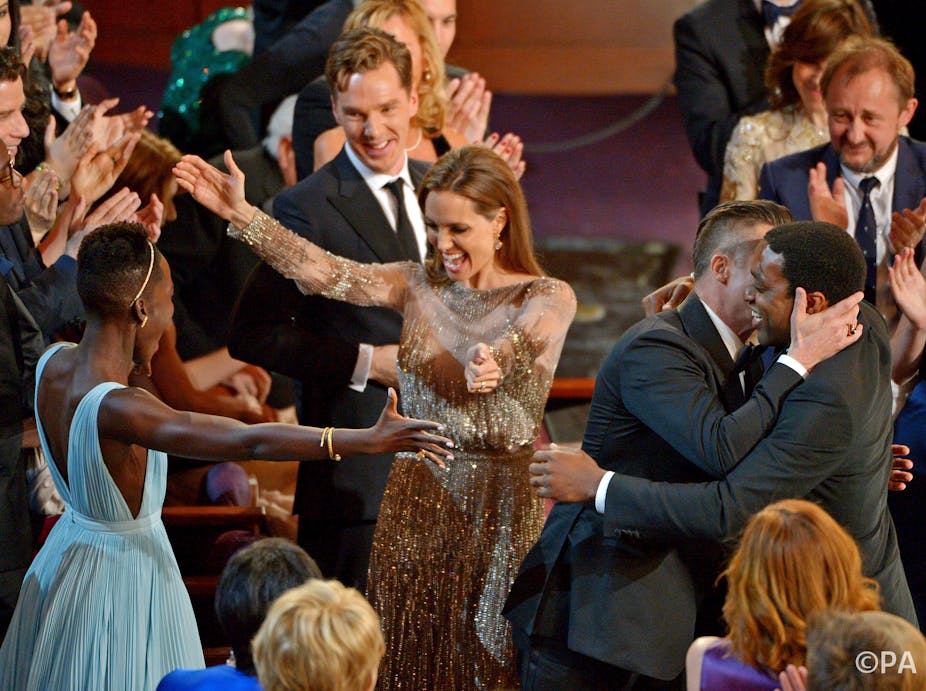The Oscars were a triumph for racial diversity. For the first time, a film with a black director won Best Picture, and Lupita Nyong'O won best supporting actress. And black British talent is currently riding high on the global stage. The front cover of the pre-Oscars Vanity Fair featured Julia Roberts flanked by Idris Elba and Chiwetel Ejiofor, alongside a range of other Hollywood stars.
But their success is not mirrored on the other side of the pond. Ejiofor, Elba and 12 Years a Slave director Steve McQueen are black British artists whose careers have flourished in the US. And they are not alone. David Oyelowo, Adrian Lester, David Harewood, the Oscar-nominated Marianne Jean-Baptiste, film directors such as Amma Asante and theatre playwright Kwame Kwei-Armah have all enjoyed major breakthroughs in Hollywood, generally after a stream of disappointment in the UK.
We cannot ignore the issues that this raises in terms of black representation in the British film industry. Asante’s new period drama feature Belle, for example, came up against a number of setbacks in the UK, even considering that she was awarded a Bafta for her debut feature, A Way of Life (2004). Fox Searchlight subsequently saw the potential of Belle and invested in it.
Likewise, Kwei-Armah left the UK to become Artistic Director of Baltimore’s Center Stage theatre in 2011 and has spoken of his frustrations of trying to get his career fully recognised in the UK. He suggested that being a black British artist in the US gives one a certain “currency”.
In recognition of this, and following the debate on the topic in February, the BBC has promised more prominent roles for black and female actors after announcing several new dramas. These will include an epic drama by Steve McQueen on the lives of black Britons and a single autobiographical drama by Lenny Henry.
The pressing need for this seems ironic given the US’s troubled race relations and its ongoing stubborn racialised hierarchies. It is no “post-race” utopia, even with Obama at the top. But despite the widespread notion that the UK is a progressive and culturally inclusive country, it is apparently too closed and limited for black actors to really develop their careers.
There have been countless public discussions and debates about this apparent conundrum – what is the “pull” of the US and the “push” from the UK really about? The “flight of the black actor” was discussed at the BAFTA Diversify event last November in a panel chaired by Lorraine Heggessey. And in January, Minister for Culture Ed Vaizey organised a roundtable discussion about precisely this issue, asking why the UK is losing black artistic talent to the US.
The debate tends to go something like this: are black artists and audiences not invested in because they do not represent a core market in the UK? Will talent (black or other) always gravitate where there is perceived to be a better level of support? Is the white, male, middle-class stronghold in the UK creative industries blocking diverse talent? Is it, quite simply, a problem of a certain kind of British insidious, institutional racism and a failure to adequately take the real proportion of ethnic diversity on board within the media?
The bottom line is that the US has more opportunities, both financially and artistically, for a broader range of social types. When it comes to arts and culture, there is simply more range and on a bigger scale. Much of this is tied to market concerns. The US is a bigger place, with more money and is acutely market-oriented; apparently making it a better place all round for those in the cultural industries. And many of the issues for black filmmakers for example, are apparent for British filmmakers at large. The BFI’s statistical yearbook 2013 outlines how few British filmmakers go on to make a second film in the UK.
And it is true that we seem to notice when black British acting and directing talent “makes it” in the US. These are bigger names that are more visible in the production process than the many behind-the-scenes creative workers that also choose to go the US to establish or accelerate their careers. And we identify black achievers more than their white counterparts, precisely because of the scarcity of mainstream black success in the UK.
But all of these explanations cannot and do not detract from the core issue: the UK still has an extremely limited range of stories, roles and ideas for black artists. Beyond Top Boy style dramas and urban-driven agendas, we still do not offer the possibilities of moving beyond these modes of representation. Questions of representation are where the real ideological tension lies, and which continues to inhibit black British artists from rising to the top at home.
So the BBC’s move is certainly a step in the right direction. But the question of whether this is enough will depend very much on its implementation, how it is sustained and rolled out across different genres. Seeing black and female actors “shoe-horned” into roles that are not credible or where the casting is not meaningful, will appear tokenistic and patronising. At the same time, some steps do have to be taken to challenge under-representation and unimaginative typing. And drama is one genre where real, deliberate decisions can be made about who to cast and how.

